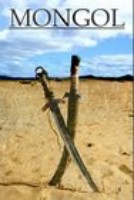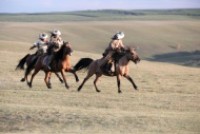Film Review: Mongol
 On Sept. 22nd, Mongol, the historical epic about Chinghis Khan (Genghis Khan) opened in Astana. The film has been anticipated since Sergei Bodrov began filming it right after the release of Nomad. Bodrov is well-known as the director of Nomad, as well as co-writer on Schizo and East-West, among his other extensive producing, directing and writing credits.
On Sept. 22nd, Mongol, the historical epic about Chinghis Khan (Genghis Khan) opened in Astana. The film has been anticipated since Sergei Bodrov began filming it right after the release of Nomad. Bodrov is well-known as the director of Nomad, as well as co-writer on Schizo and East-West, among his other extensive producing, directing and writing credits.
Mongol is an impressionistic film covering Chinghis Khan’s earlier years. It is not a plot-driven adventure film nor is it a historical epic that tells the story of how the poor fatherless slave Temuzhin became Chinghis Khan, ruling over one of the largest empires in the world. The film does show battles and portray the young Temuzhin as a great and brave warrior. It also shows that even at a young age, he had innovative thoughts about rewarding loyalty and banning the cruelties of slavery and arbitrary tyranny that tended to rule the steppes. Lip service is paid to the way that Chingis Khan organized his empire and his army and instilled a sense of responsibility to others.
However at the heart of this film is Chinghis Khan’s own psychic life. In one scene, the young Temuzhin escapes from slavery and runs to a religious shrine. While he is praying to Tengri, the sky god, a wolf is shown walking above him, looking down upon him. Then we see the boy running across the snowy steppes only to fall through an icy river. In the next scene, about 15 years have passed and we have no idea how he survived. The film is not as concerned with plot as with giving a mood to the audience.
Central to the film are the relationship he had with two people: His first wife, Borte and his blood-brother Jamuke. In reality, it is believed that these two people in fact had a huge influence on him. So we see how Chinghis Khan risks everything to rescue his wife, taken as a slave by the Kerekeidi. Later we see his wife rescue him from slavery at an even greater price. While the film does play fast and loose with the facts, it leaves you with the impression that for all his tyranny and bloodthirstiness, Chinghis Khan was a man very in love with his wife.
We also see how Jamuke helps him become a great leader and eventually his greatest rival. Again, while the relationship is historically accurate, most of the events depicted are fictional or changed slightly. Again, plot is not always the central concern of the film as it sometimes seems that the characters suddenly change their minds for no reason other than to set up the next scene. However the relationship is what comes through. That here are two men who love each other and yet are drawn to conflict. It is probably no coincidence that the actor who plays Jamuke, the Chinese star Honglei Sun, puts in the best performance in the film. Borte, played by the unknown Mongol college student Khulan Chuluun, puts in the second best. 
Unfortunately, Tadanobu Asano who is one of the most popular actors in Japan, apparently, portrays Chinghis Khan with little emotion. Except for a few moments with his wife, Chinghis Khan spends the film stone-faced, almost a victim of fate, doing whatever is presented to him. He doesn’t particularly grab the audience’s attention especially when playing next to Jamuke and there doesn’t seem to be much reflection going on in his head, particularly during an entirely fictional scene in which Chinghis Khan is imprisoned in the city of Tangut.
If you are looking for a historically accurate telling of Temuzhin’s life, this is not the film for you. If you are looking for an epic like Braveheart or Nomad with lots of battles and witty words of bravery, don’t bother with this film. But the film is well worth your time, bringing a mood to the life of the great Asian emperor and portraying a human side in the person of two people who influenced the young Khan.
Another review can be found here and much thanks to News from the Caravan for that link and for reminding me to review this flick.
I also wanted to note that one of the most interesting reactions to this film I heard was from a Kazakh friend of mine who said that it was a pity that the film only showed the early years when Chinghis Khan was fighting other Mongols, and it would have been good to show him fighting more foreigners in case people got the impression that Mongols were hateful to each other.










[…] the films that have come out of Kazakhstan or been done with Kazakh participation like Nomads and Mongol. Schizo was an excellent film and Racketeer, while not a great movie, shows some potential. I look […]